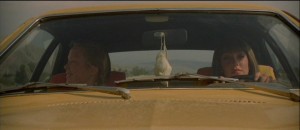Surrealism vs. Masturbation
 Robert Altman’s 3 Women is a movie often praised for its fascinating characters and trips into the surreal. Criterion clearly thought so and put in a great effort on the disc, the picture transfer is impeccable. This was also during Altman’s salad days (though Pauline Kael, a big Altman booster, always noted how he was one on, one off, so if you saw one of his stinkers, you were sure to get a winner the next time), The Long Goodbye, Nashville, McCabe & Mrs. Miller, etc. and so my expectations were a bit lofty.
Robert Altman’s 3 Women is a movie often praised for its fascinating characters and trips into the surreal. Criterion clearly thought so and put in a great effort on the disc, the picture transfer is impeccable. This was also during Altman’s salad days (though Pauline Kael, a big Altman booster, always noted how he was one on, one off, so if you saw one of his stinkers, you were sure to get a winner the next time), The Long Goodbye, Nashville, McCabe & Mrs. Miller, etc. and so my expectations were a bit lofty.
Basically a two character study, one played by Sissy Spacek, with no personality of her own, gloms onto shallow, naive, lonely and deluded Shelley Duvall. Nothing much happens storywise, especially for the first hour, so Altman focuses on paintings being done in a pool, and the images repeat themselves in other places. The movie takes more of a serious turn in the second half when one of the characters does a complete 360. Near the end, Atlman appears to lose focus (as is typical of his films, since he gives us so many perspectives) and the ending is a barrage of attempts to tie together the entire film with bouts of surrealism mixed with a cop-out of an explanation, which plays more like an after-thought than anything.
 Anyway, the imagery does not pay off at all, and just plays in a masturbatory fashion. Similar things have happened, the conclusion of 2001, passes from drug induced waves of colors and slowly becomes boredom, and then effects man Douglas Trumbull simply jerking off. Now with 2001, it’s a bit more overt than 3 Women, since it’s a very long sequence and not just things here or there and hints of another level to interpret.
Anyway, the imagery does not pay off at all, and just plays in a masturbatory fashion. Similar things have happened, the conclusion of 2001, passes from drug induced waves of colors and slowly becomes boredom, and then effects man Douglas Trumbull simply jerking off. Now with 2001, it’s a bit more overt than 3 Women, since it’s a very long sequence and not just things here or there and hints of another level to interpret.
Often, the same complaints are leveled at David Lynch, and at times, like Lost Highway, it is hard to disagree, since there is so much inherent audience contempt in that film, especially with his false attempts to tie the conclusion to the beginning of the film with a string of faint plot strands (the intercom). This is as opposed to Mulholland Drive which is more of coherent/non-sensical piece. The surrealism seems built into the structure of the film, rather than not really worked out, and added in later.
 Charlie Kaufman scripts also tend to flirt with surrealism, and what’s important is that there is the acknowledgment by the characters that something odd is going on (John Cusack and Cameron Diaz in Being John Malkovich, and Jim Carrey in Eternal Sunshine of the Spotless Mind), but they just go with it, step by step, slowly accepting their surroundings. Is it important that they do that to draw us in? At one point does random humor become outright idiocy?
Charlie Kaufman scripts also tend to flirt with surrealism, and what’s important is that there is the acknowledgment by the characters that something odd is going on (John Cusack and Cameron Diaz in Being John Malkovich, and Jim Carrey in Eternal Sunshine of the Spotless Mind), but they just go with it, step by step, slowly accepting their surroundings. Is it important that they do that to draw us in? At one point does random humor become outright idiocy?
What line does a movie have to cross to go from acceptable surrealism to flat out masturbation?



